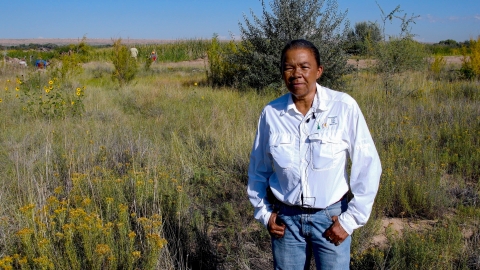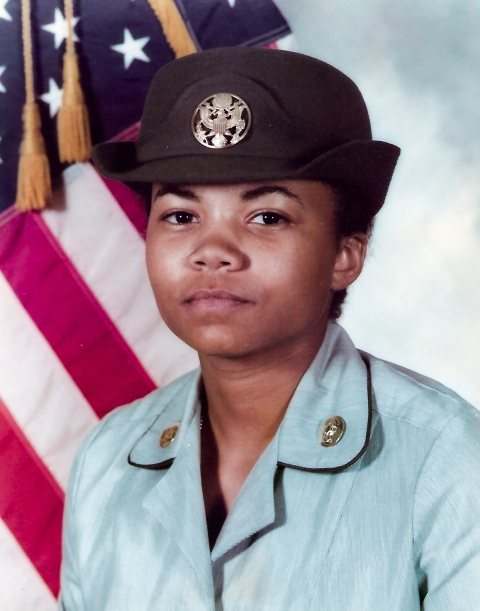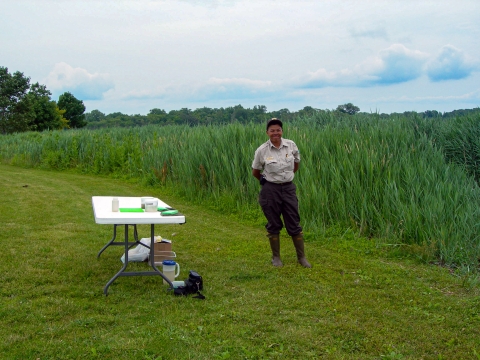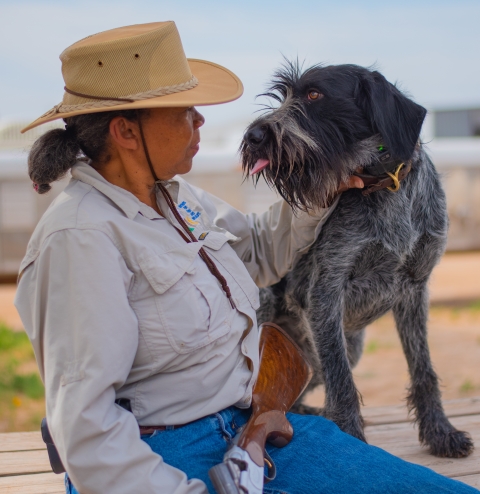“I don’t do things the same way as other people, that’s always been my moniker. I truly am a horse of a different color,” reflects Gwen Kolb, the New Mexico State Coordinator for U.S. Fish and Wildlife Service, commenting on her career as she prepares to retire.
One-hundred thousand hours; millions of minutes; scores of years — How do you measure a career? For Gwen, one metric might be the infection rate of her enthusiasm. The joy she takes in her work shines brightest while she’s on a partner’s private ranch, planning out synergistic goals for wildlife conservation with landowners. And after retirement, that’s how she intends to continue.
For Gwen, life on the farm is also where her own personal mission started. Born in Cleveland, Ohio, she spent her summers in rural Tennessee on her Uncle Eddie’s farm.
“And that's where I got my outdoor playground: a lot of our outdoor activities, a lot of farm animals,” reminisced Gwen. “Some would call me a whisperer. I have this relationship with animals, no matter what animal I meet.”
Gwen’s journey to wildlife conservation, the Service and New Mexico was long and meandering. After finishing high school, she worked some, studied some, then she joined the military.
“My dad was in the Army, he served in the Korean war, so he didn’t want me to join. I didn’t have any brothers, but I was the tomboy, so I figure it was on me to keep the tradition going,” Kolb recounted. “I was literally in the last training unit of the Women's Army Corps. We were the last unit to go through as an all-women team. After that we started integrating with male units. That's when they were starting to switch over.”
After basic combat training at Fort Jackson, South Carolina, Kolb went to Fort Gordon, Georgia, to the Army’s signal school, learning radio communications. Then at Fort Polk, Louisianna, her operational unit spent three weeks each month conducting field exercises. She became proficient with engine maintenance as she was responsible for keeping trucks and generators working in the wooded wetlands of Louisiana.
“When you're running through swamps, you can't go slow,” advised Kolb. “That's why I still got the need for speed and if I get in the woods somewhere and I see any kind of mud, I'm gonna gun it. You can't afford to get stuck when you’ve got a whole convoy behind you.”
One enlistment was enough for Gwen. The military gave her a love for traveling and picking up skills, so she kept doing that as a civilian while “honky-tonking around the country” and even across the ocean as she worked as a civilian on U.S. military bases in Germany.
Eventually she pursued formal education in her passion for caring for animals. She studied as a veterinary technician at Blue Ridge Community College in Weyers Cave, Virginia, where she was quickly recruited into the wildlife veterinary field by her professor, Dr. Stuart Porter.
“I guess he recognized something as we were working with animals. Everybody was getting bitten, scratched, or pooped on and peed on, and that never happened to me,” described Kolb “The animals and I communicate, so I guess he saw something.”
Gwen paid her way through school by working at veterinary clinics, then began volunteering at the Wildlife Center of Virginia until they recruited her to work there to care for sick and injured wildlife.
“I realized while I was fixing these animals that they didn't have a place to go. Literally, I was watching that part of Virginia, all the wildlands were disappearing due to constant development,” remembered Gwen. “There’s only so much land out there, and we are just temporary stewards of this land. If we don’t try to keep it the way Mother Nature intended, we’re all going to suffer. So that's how I got into habitat restoration.”
Kolb went back to her home state to study wildlife biology at Ohio State University in Columbus, where she also worked with the Columbus Zoo and Ohio Wildlife Center. There she was advised by Dr. Robert Gates.
“He saw my resume and the things I’ve been involved with and he said ‘You know, they got this thing called U.S. Fish and Wildlife Service,’” Gwen said. “Then I go to a job fair and meet the then Ottawa National Wildlife Refuge manager Larry Martin, and he asks me ‘So, when can you start?’ I tell him ‘You know I just started back in college, right?’”
After speaking with her advisors, Kolb realized the Service would be an excellent place for her to pursue her passion in wildlife habitat restoration and travel. She agreed, and was hired into a student-career track, and was assigned a mentor from the Service who advised her on what classes to take. She began working summers at the local national wildlife refuge national wildlife refuge
A national wildlife refuge is typically a contiguous area of land and water managed by the U.S. Fish and Wildlife Service for the conservation and, where appropriate, restoration of fish, wildlife and plant resources and their habitats for the benefit of present and future generations of Americans.
Learn more about national wildlife refuge , doing biologist work, and training Youth Conservation Corps volunteers.
Upon graduation, Gwen was offered a full-time position as a private-lands biologist, stationed at Chautauqua National Wildlife Refuge in Havana, Illinois, where in addition to her normal duties, she did everything from engine repair and heavy equipment operation, to setting up the refuge’s public use plan and marsh bird surveys.
During her 14 years as a Partners for Fish and Wildlife biologist in Illinois, Gwen helped landowners restore a lot of historic wildlands, developing partnerships and lifelong friendships.
“When we first met, she basically told me, ‘You’ve got a lot of work to do,’” said retiree Steve White who owns a tree farm in southern Illinois. “She’s a straight shooter. She’s going to tell you the way it should be, whether it hurts your feeling or not. I always enjoyed that about her.”
White’s farm received the 2022 Tree Farm of the Year Award at the Illinois State Fair mainly thanks to the diversity of native species that call his farm home, including a flying squirrel population that was thought to have been extirpated from the region.
“She constantly hammered in an emphasis on native species,” continued White. “I was asking her about this plant called Korean lespedeza for quail habitat, I asked ‘Is that native?’ She responds, ‘Does the word “Korean” sound like it’s native to Illinois?” Thanks in part to Kolb’s technical advice, today White can count on seeing several new species show up to his farm each year.
Over 60 percent of all land in U.S. is privately owned. One of the drivers for landowners to consult with Gwen is to better develop plots for hunting, a sport that largely began modern wildlife conservation. It was a major reason White bought his farm. Quite often the goals of hunters and hunting organizations align with the Service’s goals of habitat restoration.
“Gwen hit our radar screen as someone willing to reach across the table and do good things,” said Aaron Kuehl, director of habitat programs for Pheasants Forever in Illinois. “She’s helped many people recognize that alone we can't do as much as we can together.
“She’s always willing to push the envelope to put habitat on the ground,” continued Kuehl. “She was constantly finding creative solutions and partnerships to get things done, and she wasn't afraid to ruffle a couple feathers if it meant better habitat projects.
“What stood out to everyone is her passion is contagious. She’s in it for the right reasons and that wore off on everyone. She’s great at connecting triangles between different partners,” said Kuehl. Pheasants Forever recognized Gwen as the 2011 Wildlife Professional of the Year and awarded her their Lifetime Achievement Award before she left Illinois.
Gwen holds a humble attitude and considers her approach to be pretty basic.
“I don't consider myself that special. I just understand what folk are trying to accomplish. As Dr. Gates would say, ‘I meet people at their level, and then we talk,’” Kolb explained. “The most important part when you're meeting somebody for the first time, and that's what a partner's person does every time they pull up to a new site, is you listen. You give these folks their voice, and for a lot of these folks, nobody's ever listened to what they had to say. Within that first five minutes you can hear their values, their beliefs and the whole shooting match. And then you go from there.”
While in Illinois, Gwen’s friends and colleagues recommended she visit New Mexico. She went on work trips out west and quickly became enchanted by the Land of Enchantment, and was spending all her vacations there, hobnobbing at local cafes, soaking up the traditional ecological knowledge of Native American and Hispanic communities.
In 2016 she moved to Albuquerque to work as the state coordinator for the Partner’s for Fish and Wildlife Program. She kept her Illinois number so that her old friends, colleagues and conservation partners could continue to reach her.
Gwen’s not interested in a promotion to a desk job as she doesn’t want to work anywhere but in the field with landowners. Her willingness to work with people and learn has brought her many places, but as a woman of color who didn’t begin working as a biologist until her 40s, her path has been uphill.
“My advice to other women of color — be who you are,” advised Gwen. “I was expected to assimilate because of how organizations are, but just be who you are. Obey your little orders when they tell you to do something but think about it in your own way and do it how you can in your own way. Truly all people of color are people of the land. All of us have worked the land, it’s in our history. I do things my way. I've got a pretty good track record across the country for what I've accomplished as one crazy little black woman, but against the odds, here I am.”
Today, Gwen keeps up with her wildlife vet tech beginnings with her own personal side projects like supplementing neighborhood squirrels to cure them of mange. Despite pleas from Service leadership, her tenure with the U.S. Fish and Wildlife Service ends officially on December 31, 2022. However, she has no plans in retiring from her work in conservation partnerships with landowners.
“I’ll keep doing the same thing, but as a private citizen. This is what I believe in. And I see the only way into the future is by supporting these folks, in keeping them on the land. Because if people can't make money off their land, then it will get converted into a shopping center or a housing development. And if we allow this to continue, if we don't help these folks stay on this land, we're all going to suffer.
“Everybody knows Gwen, just say Gwen, and they'll know. I haven't varied from my own mission statement since I’ve been with the Fish and Wildlife Service. ‘We are stewards of this land, and we're responsible to restore and preserve for future generations.’
“Honestly, I think everyone should have their own personal mission statement. We are all a part of the big picture.”









